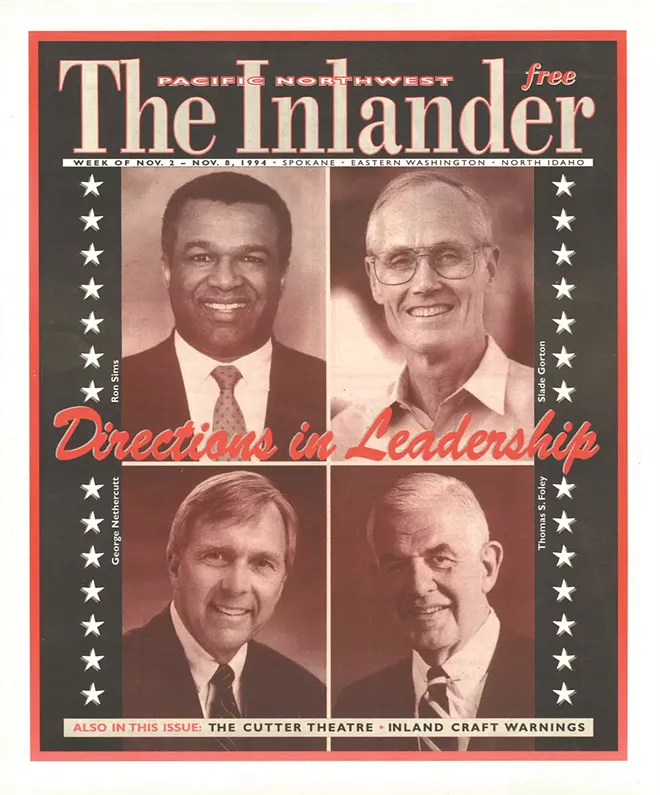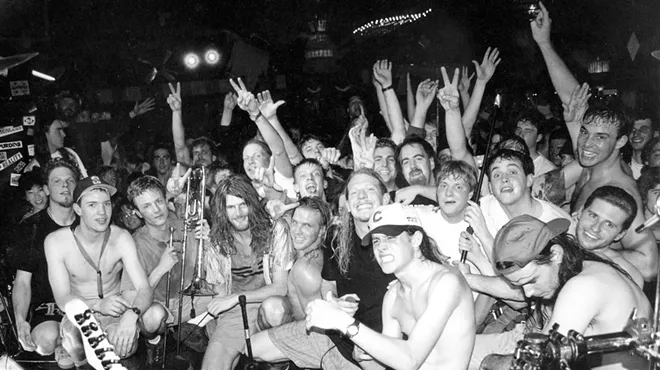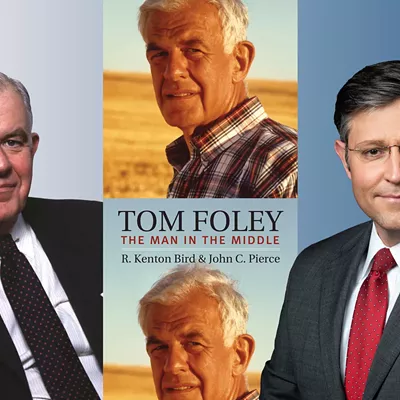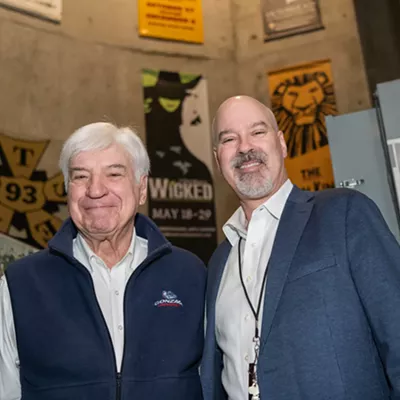Six months ago, if someone had told you that Tom Foley might lose the 1994 election, you'd probably have laughed politely at the obvious naivete behind the statement. And if you'd been told that he might lose to a guy whose campaign promises include opposition to federal funding for more local police; educational programs and perhaps even the Centennial Trail, you'd probably alert your local mental health officials. Well, it’s happening.
Why after 15 of these elections are so many voters ready to dump Mr. Congress — Thomas S. Foley — who for 30 years has been good enough?
"The reason we've had such energy in this campaign is that people want someone like them to represent them, someone who has children, who has a business, who understands what you and I go through on a daily basis," says George R. Nethercutt, Jr. "It's kind of an awakening."
Of all the reasons behind Foley's poor showing so far, the charge that he's out of touch with the district — that he's become another Washington fat cat — appears to be the most influential. Foley's new home in the D.C. suburbs is seen as a slap in the face by many voters. And the ability to send Congress a reverberating wake-up call is certainly tempting, too.
But Foley's struggle must be seen in large part through the guile of his opponent. Nethercutt has painted himself into tight corners on several issues and has refused to take stands on others, yet he remains unscathed. He signed the Contract with America but later claimed it's not binding, just a suggested guideline. He backpedals from a position paper he wrote and he relies on vague platitudes while Foley cites numbers, votes and details. But none of it seems to matter. Like Ronald Reagan, Nethercutt seems to be a Teflon candidate. People like him.
And like Reagan, Nethercutt believes less government is always good, and the states should solve their own problems.
The Fifth District race is a big one for the Republicans, and Nethercutt's campaign has been assisted by the GOP at the national level. Aside from repeating the theme of change, Nethercutt's camp has been accusing Foley of negative campaigning since Foley's campaign began to point out Nethercutt's record on issues, starting with his written support for the Kasich Bill. It's hard to tell whether Nethercutt truly believes publicizing candidates' records on the issues is negative or if it is simply a campaign strategy — say it's negative enough and people will believe that Foley is using dirty tactics. (To see some real nasty campaigns, check out Massachusetts or California.)
Meanwhile, Nethercutt's spokesman has admitted that the fact that Tom and Heather Foley have no children is purposely being used as an issue against the speaker.
If the Foley camp wanted to go negative, they could certainly bring up the issue of Nethercutt's medical deferment from service in Vietnam — a point of information being looked into by one national publication and at least as significant as Foley's parental status.
(Selective Service documents show that Nethercutt lost his student deferment in 1966, before his senior year at Washington State University. His campaign has confirmed that his subsequent physical exam revealed that he had high blood pressure, a condition that permanently removed him from the draft board's consideration. He was on medication for the condition for a time, but has since been able to control the problem with diet and exercise. Students typically lost their student deferments for not carrying enough hours in a given semester or for making low grades, says Lew Brodsky, assistant director of public affairs for Selective Service.)
There are certainly issues of greater importance to the district's future than these. The direction of a nation hangs in the balance of this and several other key races across the country. The decision about which direction to choose must start with the question:
HOW BAD IS IT?
Unemployment, inflation and interest rates are low. Spokane is growing — businesses, people and money are all coming this way. New markets are opening up for Eastern Washington farmers. So why are voters so bummed out?
In the mass media age, perception is reality. For example, in 1992 the nation believed that curing our ills was killing us financially. Enter the insurance industry, and televised threats that you'd have to wait a year to get a prescription under "socialized" medicine. The result? Today, many think we don't really need reform after all.
The current victors in spin control are the Republicans, who are successfully blaming Clinton and the Democrats for improving the economy and shrinking the deficit. And they are somehow managing to avoid blame for all of their filibustering that has killed things like campaign finance reform. Never has a sitting president been in such low demand for campaign stops by members of his party.
But Republicans may have stumbled with the Contract with America, a document so sprawling it contains something to offend nearly everyone. In the Fifth District, Foley has pointed out that the contract would require cuts to either Medicare or Social Security and could jeopardize farm subsidies.
Even arch-conservative William Kristol, former chief of staff for Dan Quayle, says that the Republicans are playing with fire by standing for things not because they are right or wrong but because they serve a political end. And, Kristol claims, that end is more and more often to encourage discontentment and deepening pessimism among the people.
"There's a sense of insecurity that exists, despite the economic news — there are so many positive signs in the region and the district," says Foley.
"The national mood has been encouraged to be overly pessimistic by media commentary, the daily barrage of some talk radio and the pessimistic assessment of some television programs. [These things] are causing a lack of public confidence in a variety of public institutions. It doesn't reflect the reality in society."
Nethercutt has had to back away from some details of the contract, leaving Foley to wonder aloud what good his signature is. In addition, by signing the contract, Nethercutt, whose major campaign theme is that Foley has been in office too long, finds himself allied with establishment Republicans like Newt Gingrich.
It’s easy to get an uncomfortable feeling when you see Newt Gingrich, the man who could be speaker, parading around the country with the grin of a kid who just figured out where mom hid the Halloween candy. But he’s just one of the sharks that have begun to circle the 5th District since they could smell Foley’s blood. All the attention is nice, but could it be that we’re being used?
Eastern Washington could be a major stepping stone for Gingrich, whose political profile is, to put it politely, on the opposite end of the spectrum from Foley’s. He’s currently being investigated for his involvement in pseudo-PACs that are bringing him income. He has also recently been accused of inserting language into the campaign finance reform bill last session that was later used by Senate Republicans as cause to filibuster it. Some Democrats believe he did it knowing it would ultimately hold up the bill.
But the ultimate question here, and one that Foley keeps harping on is that if Nethercutt and a handful of other Republicans win, the speakership will move to Marietta, Georgia. And aside from what that could bring the folks in the Atlanta area, it’s what Gingrich could do to Washington that worries people here, especially in the Tri-Cities. Gingrich is on the record saying that the $1.5 billion being spent every year by the federal government to clean up health hazards at Handord could be trimmed to $100 million. Gingrich recently denied that he would push for the cut, which could cost the Tri-Cities 15,000 jobs.
If Foley loses but the Democrats retain control of the House, Richard Gephardt of St. Louis will likely become speaker. Many legislators are privately concerned because Gephardt is considered more difficult to work with. — T. McGregor
CHANGE
As in 1992, change has been called the biggest issue in this election and the notion of change has been anything but specific. One voter said, for lack of better reasoning for removing Foley: "Sometimes you just want to change things." Sounds a lot like deciding to rearrange the furniture. But if it's change people want, they have a chance to make a huge one in this election. Some of the specific changes Nethercutt has endorsed include term limitations, a line-item veto and a balanced budget amendment.
Outsiders are confused over the mood in the Fifth District. By way of explanation, a recent New York Times article found ignorance to be one factor behind the change theme — ignorance about what losing the speakership would really mean. There's the now legendary story of a woman announcing to her friends that she was going to hold a coffee for the new Speaker of the House, George Nethercutt.
Nethercutt knocks Foley for not voting regularly, and promises to vote on every bill. A vote is fine but the political reality remains: the construction of a bill is where the real action is, and nobody has more sway over that process than the Speaker — a fact that Foley may not be communicating adequately to his constituents.
Nethercutt has been relatively close-lipped about exactly how he would change things. Aside from his pledge to vote on every bill, he has said he would oppose some federal money that is earmarked or allocated for this region — a stand that would be political suicide in most districts. Nethercutt advocates putting a cap on all unnecessary spending until the federal government puts its house in order.
"I look at [ the current situation] as sort of a freight train heading down the tracks toward a cliff at 100 miles per hour," says Nethercutt. "This year, Congress has taken us back down to 90 miles an hour, but we're still headed for the cliff. I think it's time to get somebody in there to put on the brakes and slow down the freight train. And then start to head the other way."
THE GOLDEN PIG
The Fifth District has been the beneficiary of some major federal projects, largely due to Foley's influence, so it's useful to ask both candidates what separates legitimate investment by the government from pork.
Foley: “My definition of pork is something that doesn’t have a valid purpose and is spent to enhance the position of the political person that delivers it.”
Nethercutt would apply the following test to any project: “What can we live without and what do we absolutely have to have, and if we have to have it do we have to have it today?”
Nethercutt has suggested that funding for projects like SIRTI, the Centennial Trail and even new police officers may be pork, but has said that farm subsidies, which are regarded as pork by people in other parts of the country, are not.
On this issue, Nethercutt seems to stand for a whole new system of federal distribution — a lofty goal for someone who says he'll only serve six years if elected. His approach marginalizes the current reality that the government is a major cog in the nation's economic growth. "Government's too big, it spends too much," he says on TV. True enough. But if ground to a halt (as he advocates for local projects), the void left by government could have disastrous effects (look at California after the Cold War). Most agree that too much government is bad, but to ignore its positive role in society is either disingenuous or naive.
TERM LIMITS
Foley's opposition to term limits, which voters in Washington accepted despite the fact that Fifth District voters rejected the measure, has been a major issue in the campaign. The issue is now before the Court of Appeals in San Francisco, and Foley continues to stand by his belief, which is shared by the League of Women Voters and numerous scholars, that Term limits are unconstitutional.
What would term limits do for us? Maybe not what most supporters envision.
If a handful of states enact term limits, bigger states like Texas, California, New York and Florida, which don't have term limits, would be able to dominate Congress. Many believe small term-limit states would suffer as their legislators will never be able to gain the clout to oppose the entrenched representatives. The seniority system has, throughout history, acted as a leveler, giving smaller states the opportunity for equal footing.
This dynamic is exactly why Sen. Larry Craig of Idaho recently reversed his position on the issue. Formerly a supporter of term limits; he changed his mind because he felt without senior representation in D.C., Idaho would be at the mercy of states like California, which have long coveted Idaho's water.
Term limits also limit voters' ability to exercise their vote for their favorite candidate. Term limits are built into the free election system - you can elect somebody new every time. If campaign finance reform can ever be passed, those elections will begin to be more fair.
GUNS AS AMMO
"[The NRA] is denouncing me for doing what I thought people wanted. I wouldn't simply follow the NRA blindly, and I will continue to support the rights of sportsmen, but these are weapons designed to kill people," explains Foley of his support for a ban on 19 assault weapons. "I just don't see the justification for proliferating hundreds of thousands or even millions of these assault rifles."
Apparently the NRA doesn't share the view of Foley and 75 percent of the American people, as the group has brought Charlton Heston in to promote Nethercutt's candidacy (although Nethercutt has distanced himself from the NRA's TV ads, he is scheduled to attend a Seattle fund-raiser with Heston before the election).
Nethercutt says crime is about criminals, not guns, but you don't go away on vacation for two weeks and leave your front door wide open. Similarly, the flood of cheap, dangerous guns (such as the Chinese-made assault rifle used to shoot up the White House last weekend) has made it easier for criminals to terrorize this country. And the direction toward more prisons and tougher sentencing, while part of the answer, does nothing to guarantee that American families will be protected from tragedies of violence.
DIRECTIONS IN LEADERSHIP
In elections we hold up a mirror to our collective selves, issues are wrestled with, consensus is reached (sometimes) and the elected person takes the fruits of the debate with him or her back to the Capitol as a mandate. So what do we see this time around? For whatever reason, voters are unhappy with the way things are. Perhaps it's those damn voices in our heads (talk radio, schlock TV), or maybe it's just uncertainty over the rapid pace of change in our society today. When faced with the complexity of the world and our rising awareness of it, we long for simplification in our lives.
Both candidates aim to calm that uncertainty. Foley tells us that things are improving under the Clinton administration but more work needs to be done. Nethercutt says things are terrible and wholesale change is the only hope. Both are using a different set of criteria, but what criteria should the voters use? That's the challenge of voting wisely in these days of spin control and Hollywood-produced TV spots.
At the bottom of it all, Foley is saying he will bring more of the same, believing that voters have been happy with his performance.
Nethercutt has remained vague on issues, not even saying how he would vote on many. Some of his statements, however, do reveal a zeal for taking on the system — such as his notion about giving wealthy seniors "incentives" not to take all their social security payments, or when he suggested that the federal government should "get the heck out of education."
Really, these ideas are revolutionary when compared to the mainstream of even his own party. But if that's what it takes to shake things up, his backers say, then so be it.
One reality holds. Campaigns are waged on a level rarely ascended to in public life. Once sworn into Congress, few legislators have the ability to affect policy in the way that they talk on the issues in debates; least of all a freshman congressman. A freshman, typically, can hope to get some decent committee assignments, make some contacts and build seniority to better serve their district. But Nethercutt says he will only stay six years, about enough time to learn where the bathrooms are, Beltway insiders say.
Of all the 435 legislators, Foley is one of the few able to walk every day on that level, where policy is made and the direction of the ship of state is charted. And he's there because his district has put him there time and again. But these are angry times, and voters have the chance to let out one primal scream in defeating Foley. Perhaps it's best seen in the statement of a farmer who said removing Foley from office would be like shooting your foot off. In the next breath, he said he didn't know why, but he was going to go ahead and shoot it off. ♦


























